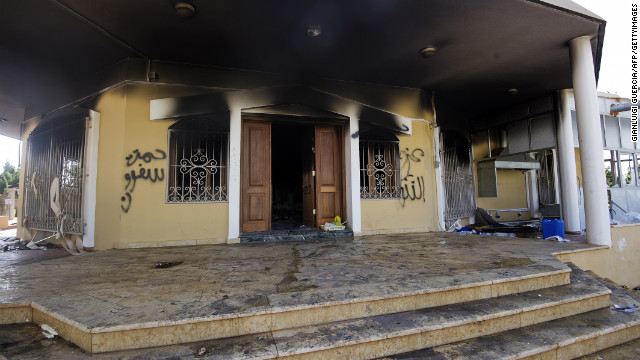
American authorities are examining whether the leader of a post-revolution terror network in Egypt played a role in the September 11 attack on the U.S. Consulate in Benghazi, Libya, according to a U.S. official with direct knowledge of the investigation.
Muhamed Jamal Abu Ahmed
has been detained by Egyptian authorities; however, the FBI has not yet
had access to him, the official said.
Asking not to be
identified because of the sensitivity of the case, the official says Abu
Ahmed came to authorities' attention after the attack and has remained
there for "a long time."
The source would not
comment on what led to Abu Ahmed or on any possible intelligence shared
between the United States and Egypt, but an Egyptian security official
told CNN there was cooperation between U.S. government officials and
Egyptian security authorities.
Abu Ahmed, a well-known
jihadist, was released from jail after the downfall of Egyptian
President Hosni Mubarak. He's believed to be the driving force behind a
new terror group seeking to align with al Qaeda, the two officials said.
He was arrested by
security forces in the province of Sharkia two weeks ago in a house
rented under a different name, according to an Egyptian security
official. He had two machine guns, ammunition and a laptop. His
temporary detention has been extended to 15 days for further
investigation.
He admitted that he had
traveled to Libya several times during the revolution there and joined
the resistance but denied any connection to the attack on the consulate
or affiliation with al Qaeda, the Egyptian official said.
Egyptian intelligence
officers believe he has an affiliation with a terrorist cell in Cairo's
upper-class Nasr City, where five suspected terrorists were captured
after a fierce gun battle with security forces in October. The cell
became known as the Nasr City cell.
Explosive belts,
rocket-propelled grenades, machine guns, hand grenades, rockets and
ammunition were found in the flat when the five suspects were arrested.
The cell is accused of
planning to blow up government buildings, the Interior Ministry and
embassies and to assassinate high-profile political figures, according
to their statements to authorities and information retrieved from their
laptops. They are also accused of unspecified connections to the
Benghazi embassy attack.
Muhamed Jamal Abu Ahmed and the five suspects will face trial in a security court soon.
Abu Ahmed, 45, who holds
a master's degree in sharia law, was imprisoned during the Mubarak era
on charges of "conspiring to topple the regime," but was not convicted.
He was released from prison after uprisings began on January 25, 2011,
and eventually toppled Mubarak. He speaks English, stands about 5-foot-7
and maintains a thick beard.
But the U.S. government
suspects he may have led a terrorist ring in Libya and provided training
and funding for them before ordering them to attack the U.S. Consulate.
He denies such charges and claims he was fighting alongside the rebels
in Libya.
Most of the weapons
retrieved in the Nasr City flat are not new in Egypt, but the rockets
and explosive belts alarmed the security officials. An influx of weapons
arrived mainly from Libya and Sudan during the security vacuum that
followed the uprising.
Meantime, another
possible suspect, Tunisian Ali Ani al Harzi, remains detained in
Tunisia. He was picked up in Turkey following the attack on the U.S.
Consulate.
After weeks of
attempting to gain access to al Harzi, the FBI finally met with him in
the presence of Tunisian authorities. However, al Harzi refused to talk
with American investigators, according to the U.S. official.
No comments:
Post a Comment